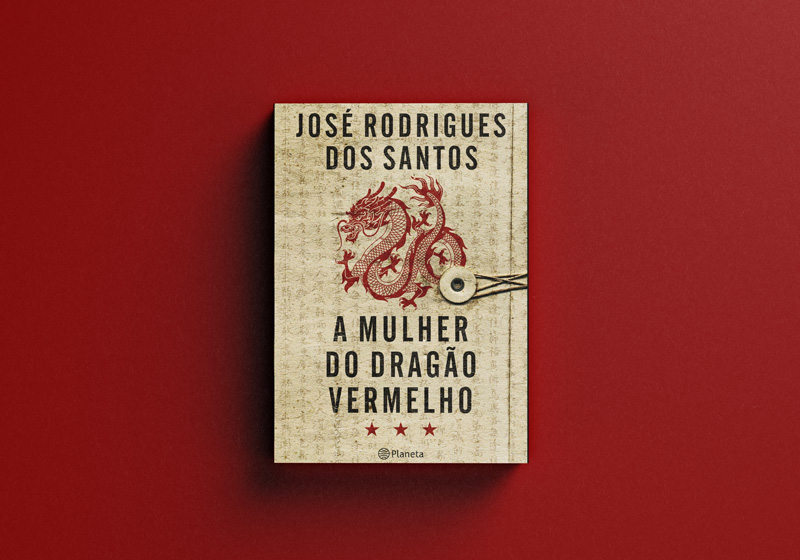Interview for Sábado
- Your new novel takes place in locations like Amritsar or the Chinese province of Xinjiang. How did your attention originally turn to this part of the world?
JRS: The Red Dragon Woman is a novel about the greatest threat in the world to freedom. The most dangerous country today is not Russia. It’s China. Or, more specifically, the Chinese Communist Party. China has set up a police state with permanent surveillance of its population, it has built over a hundred concentration camps, it has locked up to three million people there, it practices torture and brainwashing operations on them, it carries out large-scale ethnic persecution, it identifies populations by racial markers, it has recovered practices of slavery and it has even adopted policies that fall under the UN definition of genocide. Not only this, it plans to become the world’s greatest power and export to the entire planet the dictatorial system it has set up within its borders. This is not 1930 in Communist Russia or 1944 in Nazi Germany. It’s happening today, in the 21st century, in our world, involving one of our largest trading partners. It’s all this that The Red Dragon Woman talks about. The question, then, is not why my attention has turned to this part of the world, but why is not everyone’s attention already turned there?
- Why, then, do you think that everyone’s attention is not already turned there?
JRS: In a way the answer is embedded in The Red Dragon Woman. China has become a very powerful country and questioning her involves retaliation. Few countries, institutions or people are therefore interested in defying her. Moreover, it should be kept in mind that China has already kidnapped European citizens who criticised its regime and is imprisoning people for the crime of being relatives of critics of the regime. Just recently, a Uighur activist, Rushan Abbas, who has a sister imprisoned in a Chinese concentration camp, was in Lisbon. What’s her sister’s crime? Being the sister of a human rights activist. So, most people prefer to shut up and look elsewhere.
- In this novel, as in others by Tomás Noronha, one feels an interaction with today’s geopolitical reality. Is there a demarcated line between reality and fiction in the book? Can readers expect full factuality from the geopolitical elements that frame the fictional story of Tomás Noronha, Maria Flor and Madina?
JRS: All my readers know that my fiction is nothing but a thin veil that separates narrative from reality. Tomás and Maria Flor are fictional characters, but the realities their adventures uncover are portraits of our world. Everything my novel says about China, or more exactly about the Chinese Communist Party, is true. Even the most incredible things, such as sending to concentration camps people whose “crime” was downloading WhatsApp or taking phone calls from relatives abroad or not smoking cigarettes or not playing football. It sounds like fiction, but it’s happening.
- In addressing topics such as crimes against humanity and the geopolitical ambitions of the Chinese Communist Party, do you have activist or awareness-raising ambitions for your readers?
JRS: My ambitions as a novelist are the same as those I have as a journalist: to capture the reality that hides before our eyes and expose it to readers truthfully. Isn’t that the job of a journalist? Isn’t that the function of a writer?
- What kind of research was involved in the creation of this book? How did the process differ from previous ones?
JRS: Research is always a strong point in my novels, as any of my readers knows, given the strong relationship I establish between fiction and reality. Each work has specific research requirements, it’s true, but essentially the process is always the same: I try to research a subject in depth until I master it in its various aspects and then I expose it using the techniques of fiction.
- Could you expand on this question? What kind of sources do you usually consult? Where do you usually find the most interesting or summarised information? And how do you go from reality to the construction of fiction?
JRS: Research depends on the type of novel I’m writing. For example, if there are living witnesses available, that’s an important source. But if the event took place centuries ago, research obviously must be based on documents. Each subject dictates the kind of research I carry out and research dictates the novel.
- On the back cover of the book there is the sentence “Is China more dangerous than Russia?”. How would you answer this question?
JRS: The answer is in the novel. Whoever reads The Red Dragon Woman, and considering that the information in the novel is true, will know in the end how to answer that question.
- The book’s promotional material paints China as “the greatest danger hanging over our civilization today”, but the presence of agent Charlie Chang implies an acknowledgement of the role of the United States in today’s political-ideological rift. What is your reading of the current antagonism between East and West, and the role of the superpowers on both sides in that opposition?
JRS: The war in Ukraine has suddenly made visible a conflict that has been quietly taking place in the world. On one side, liberal democracies. On the other, autocracies and dictatorships. The autocrats believe that democracies are decadent and on the verge of collapse, an idea already present in Lenin, Mussolini, Stalin, Hitler, Khrushchev, Mao. This current of thought has reached Putin and Xi Jinping. It’s a cleavage between open societies and obscurantist dictatorships with messianic tones that invariably end in tragedy. Read The Red Dragon Woman and, from the case of China, you will understand Russia and what is happening in Ukraine. You will understand our world and the clash that is currently taking place in it. You will understand the challenges we face and the difficult choices ahead of us.
- This is your debut as an author with Planeta. Has the change of publisher altered your literary production in any way? What changes does it introduce?
JRS: My way of writing is independent of the publishing house that publishes me, that goes without saying. But it’s important to stress that Planeta is a major world publisher and has the means and the capacity to take its authors to even higher levels on the international market.
- Are these your ambitions, the project you have for your career? How do you see the ideal scenario for you as a writer and for your books? Do you want to be the best writer, the most successful writer, or a mixture of both?
JRS: I have the normal ambition in any writer: to be read. But I don’t set specific goals, that’s not how I work. I write about what interests me and in the way that interests me, and I hope that what I write is understandable and interesting to readers. Am I going to be the best writer? Am I going to be the most widely read? I have no such pretensions. I simply seek to write good stories well told.
- You are one of the most prolific Portuguese authors today. Do you have a formula for producing novels? What criteria must be met for you to reach the conclusion that you have a story in your hands?
JRS: I look for subjects that, being true, are little known to the public. I like to dismantle myths and break taboos. I like to show what cannot be seen, to say what cannot be said, to touch the untouchable. Isn’t that what literature is all about? Whoever thinks that what’s important in novels is style does not understand what literary writing is all about. The eternal theme of literature is truth, always truth.
- Pursuing this point a little further: novels are not, in fact, reduced to style, but style is a considerable component of many novels, and there are certainly works that point to something other than reality (or at least not as much as yours). Can you explain how you see this relationship between literature and truth, perhaps taking examples from the works of other authors you admire?
JRS: To be honest, I don’t know of any novel that has become immortal purely because of its style, but I do know of novels that have become immortal purely because of their content. I think it was Milan Kundera who remarked that George Orwell’s 1984 is, from the point of view of style, perfectly unremarkable. So why has 1984 become a universal piece of literature? Because it expressed a profound truth about Communist totalitarianism, namely its total surveillance state, something no one had ever done before in this way. In his private notes, Orwell observed that Communism as a regime was strangely similar to Fascism. It was this insight, which pervades Orwell’s novel from the first to the last page, that made 1984 an immortal work. Note that I am not denying the importance of style. It is very important. What I am saying is that the essence of literature does not lie in style, but in the profound truths that literary works convey in the garb of fiction.
- With the accumulation of published books and completed stories, do you feel any difficulty in continuing to find ways to express yourself creatively, so as not to repeat yourself or get into redundancy? Or has this never been a concern for you?
JRS: The subjects of my books are always different. My novels touch on biology, mathematics, physics, economics, politics, art, history, philosophy, in fact all branches of knowledge. In this sense I never repeat myself, although there are novels that, due to their subject, have a natural continuity with other novels. I am interested in the meaning of existence, for example. Now this theme is present in different novels of mine, from The Captain’s Daughter to The Einstein Enigma, from The Key of Solomon to Sign of Life or Immortal, though always tackled in different ways.
- Did you perhaps have an epiphany on the question of the meaning of existence in the process? Or, in other words, what has researching and writing your books taught you about this universal mystery?
JRS: To know what I have learned, one must read my books, because my work deals with that subject in different ways. It seems clear to me, however, that our categorization of reality is nothing but a functional artifice. We divide the study of reality into separate disciplines. We have mathematics, physics, chemistry, biology, psychology, sociology, history, philosophy, even art. But the separation between these disciplines only exists in our method, not in reality. Reality is one. Everything is interconnected. To understand life and the universe, we must start by understanding that. That’s why my novels address disciplines that are so disparate from one another, from mathematics to history, from philosophy to physics, from life to aesthetics, always in search of that interconnected whole. I am interested in science because it is a dialogue that we establish with the universe and it is thanks to the answers that the universe gives us that we are able to peek beyond the veil where the great mystery of existence is hidden.
- How do you usually interact with the (positive and negative) reception of your work?
JRS: The reaction of readers is extraordinary, both in Portugal and abroad. But what readers think of my work, you should ask them, not me.
- Over the years, what keeps bringing you back to your main character, Tomás Noronha?
JRS: The search for knowledge. Tomás is an academic, and his thirst for knowledge takes him to the most varied subjects and to the most exotic places. Travelling with him is an adventure that I hope invites us to reflect on our world, on who we are, where we come from and where we are going.
- What changes do you see in the character of Tomás Noronha between O Codex 632and this book?
JRS: Tomás evolved with each adventure, just like me. With each story I got to know him better, and as I invented him he gained more and more definition. He’s not a hero, but an anti-hero. He is flawed, he falls into temptation, he messes up and he makes mistakes. But he is intelligent and persistent, and it’s these qualities that ultimately make up for his flaws.
- Do you believe that his evolution as a character has in some way accompanied your own as a writer?
JRS: I always evolved as a writer, of course. But note that my work as a novelist is not limited to the adventures of Tomás Noronha. Novels like The Captain’s Daughter, The White Angel, The Man from Constantinople, The Lotus Flowers or The Magician of Auschwitz, to quote just a few examples, are not Tomás Noronha adventures, they are novels about historical events with philosophical implications. The Captain’s Daughter talks to us about destiny, The White Angel about ethics, The Man from Constantinople about beauty, The Lotus Flowers about governance and The Magician of Auschwitz about transcendence. All are different subjects, all speak to us about humanity.
- Do you have in mind, or can you conceive, an end to the story of Tomas Noronha?
JRS: If Sir Arthur Conan Doyle killed Sherlock Holmes, why couldn’t I kill Tomás Noronha? Many readers sense this possibility, but I won’t say a word about it.
- A story doesn’t necessarily have to end with death. It can just be a closure of the adventures. Or do you believe that, if it ends, this story will necessarily end with the death of Tomás Noronha?
JRS: Everything in the universe has an end… including the universe itself. This implies that one day Tomás Noronha will disappear. He will disappear with his own death or with the death of his author. Everything has an end.



